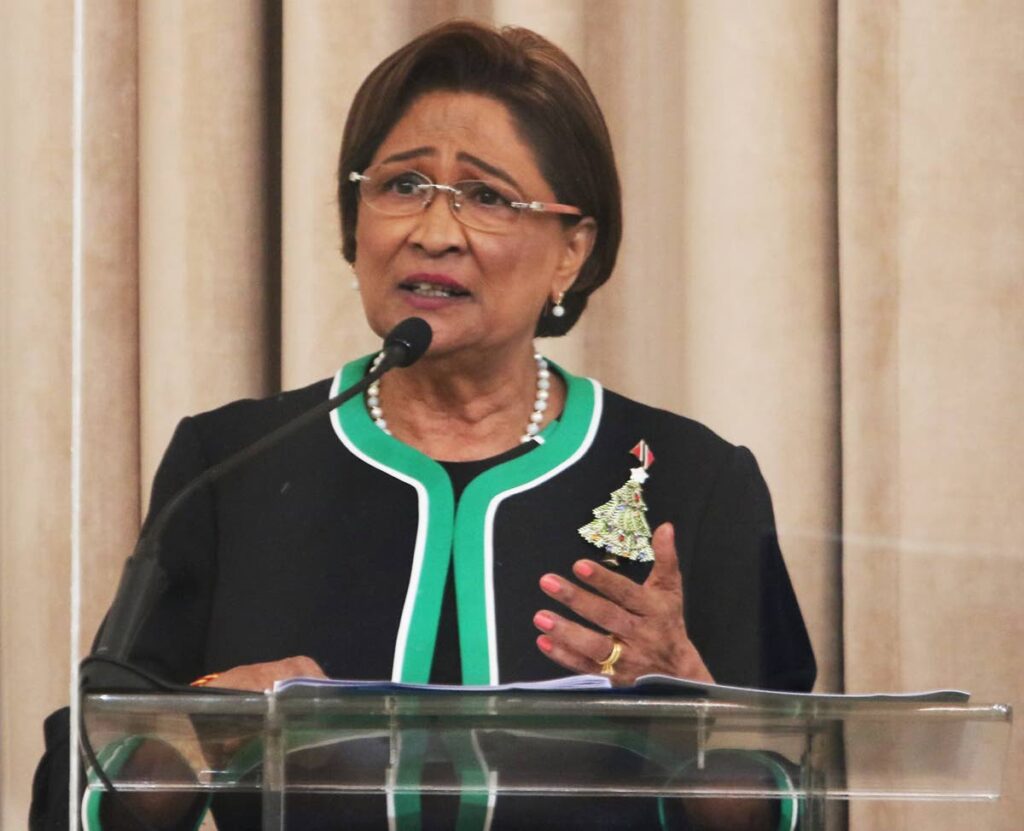UNC proposes increase in Defence Force retirement age as crime-fighting tool

Opposition Leader Kamla Persad-Bissessar says that if she is re-elected as Trinidad and Tobago's prime minister she will increase the retirement age for members of the Defence Force (TTDF) and restructure the Ministry of National Security into two distinct units in an effort to fight crime.
Persad-Bissessar also proposed an increase in the entry level qualification for police recruits, ankle bracelets and house arrest initiatives, minimum detention centres, law to prevent incarceration of non-violent drug offenders, state support for children of prison inmates and a fund for children who have lost one or both parents to crime.
Persad-Bissessar rolled out the proposals at the United National Congress (UNC) virtual report on Monday night.
Only recently the Opposition chastised Government for its proposals to increase the retirement age from 60 to 65, but explained her rationale for increasing the age of the TTDF personnel, the majority of whom retire at age 47.
“We must enable the retention of experienced personnel within the respective arms of the military. Research has shown that our current defence force retirement strategy is not in keeping with industry best practice. In the case of Canada and Denmark, the compulsory retirement age for regular forces and primary reservists is 60 years.
She quoted statistics from Norway where military personnel can serve a maximum of 40 years or up to the age of 60, whichever comes first. Australia has a general ceiling for commissioned and non-commissioned officers of 60 years based upon a person’s ability to perform their job regardless of their age.
“Records show that within the TTDF, over 98 per cent of its personnel never continue after the age of 50 years primarily because of the present retirement age.”
She said there was also a significant proportion of servicemen at the rank of major, lieutenant commander and squadron leader who must retire at 47 – approximately half of an average work life.
She said that approach generated a large pool of young retirees who were not re-employed in many instances and remain "out of pocket" until they become pensionable.
“The extension of retirement ages would therefore assist in the retention of experience across the force,” she said adding that many with great potential had left the service for jobs which provided longer tenures of service.
“The recommendation for an increase for all serving members of the Coast Guard, Air Guard and the Regiment would allow for the TTDF to adequately meet its local, regional and international commitments.”
With respect to getting the best qualified police officers on the job, Persad-Bissessar proposes the development of academic programmes in law, governance, criminal justice system, cyber-crime and forensic investigations, among other courses, for undergraduate and post graduate degrees in policing, combined with a part-time police apprenticeship practical programme.
The programmes would be offered at the so far idle UWI Debe campus.
“They never understood the vision behind that campus. The St Augustine campus could only take a certain number of students and there was not enough space there to expand,” she said as she defended the campus built under her PP administration.
Noting the disruptions and negative outcomes parental incarceration can cause for children, including poor academic performance, aggression, depression, delinquency and substance abuse, Persad-Bissessar spoke of plans to offer financial, psychological and emotional support for those children.
For children who have lost one or both parents to crime she said, although no amount of money could replace a parent, a fund would be set up to provide the necessary support.
Among other initiatives to alleviate the crime pandemic plaguing the country, she has suggested the use of ankle bracelets and house arrest to reduce current expenditure for housing prisoners who are non-violent, old or infirm, or pose no risk to society.

Comments
"UNC proposes increase in Defence Force retirement age as crime-fighting tool"